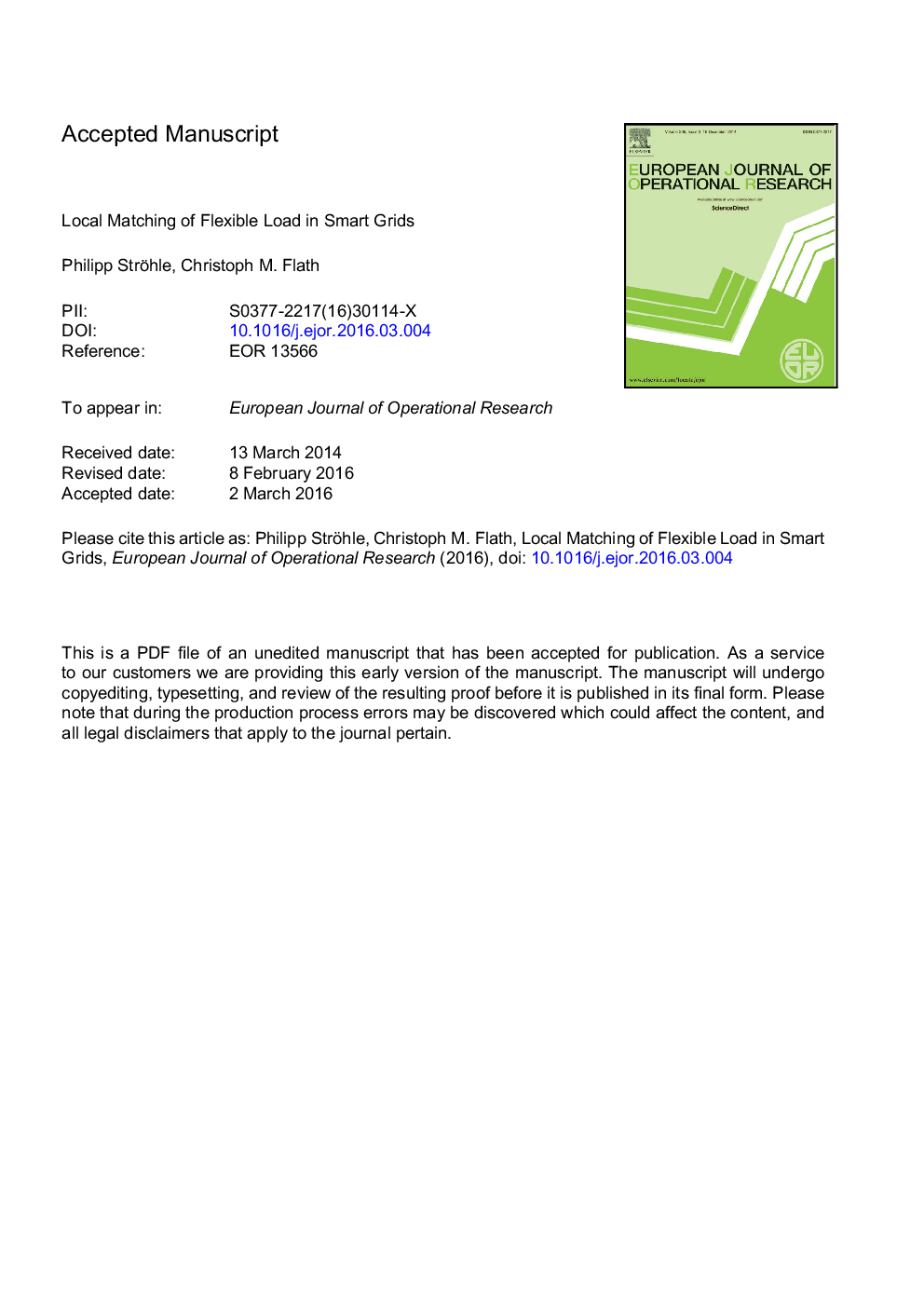| کد مقاله | کد نشریه | سال انتشار | مقاله انگلیسی | نسخه تمام متن |
|---|---|---|---|---|
| 6895567 | 1445976 | 2016 | 42 صفحه PDF | دانلود رایگان |
عنوان انگلیسی مقاله ISI
Local matching of flexible load in smart grids
ترجمه فارسی عنوان
مطابقت محلی بار انعطاف پذیر در شبکه های هوشمند
دانلود مقاله + سفارش ترجمه
دانلود مقاله ISI انگلیسی
رایگان برای ایرانیان
کلمات کلیدی
یا در انرژی، شبکه هوشمند، انعطاف پذیری بار طراحی مکانیزم آنلاین،
ترجمه چکیده
سیستم های قدرت در حال حاضر در حال گذار از نسل های اولیه سوخت فسیلی به سمت سهام بیشتر انرژی های تجدید پذیر هستند. به طور فزاینده ای برای مدیریت عدم قطعیت و تنوع در عملیات سیستم های قدرت صرفا از طریق دارایی های انعطاف پذیر تولید می شود. انعطاف پذیری با استفاده از ساختارهای انگیزشی طراحی شده می تواند یک اهرم اضافی برای تعادل تقاضا و عرضه را اضافه کند. بر اساس یک مدل عرضه با استفاده از داده های تولید انرژی باد و یک مدل گسسته تقاضای انعطاف پذیر با محدودیت های زمانی، ما یک مکانیزم بازار محلی آنلاین برای تطبیق بار انعطاف پذیر و عرضه نامناسب طراحی و ارزیابی می کنیم. تحت این مکانیزم، گزارش درست انعطاف پذیری، یک استراتژی غالب برای مصرف کنندگان است که پرداخت ها را کاهش می دهد و امکان تخصیص را افزایش می دهد. تامین کنندگان، در دوره های کمبود عرضه، از افزایش پرداخت های بحرانی ارزش در نتیجه رقابت ناشی از انعطاف پذیری در طرف تقاضا سود می برند. ما دریافتیم که برای طیف گسترده ای از پارامترهای کلیدی (ظرفیت عرضه، سطح انعطاف پذیری)، هزینه تضمین سازگاری مشوق در یک بازار هوشمند شبکه نسبت به تطابق مطلوب با رفاه، نسبتا کوچک است. این نشان می دهد که تطبیق محلی تقاضا و عرضه می تواند به صورت غیر متمرکز در حضور یک طرف تقاضای به اندازه کافی انعطاف پذیر سازماندهی شود. گسترش مدل تقاضای تلطیف شده برای ساختن ساختار تقاضای تکمیلی، نشان می دهد که تطبیق غیرمتمرکز، تنها ضعف های کارآیی جزئی را به وجود می آورد که اگر تقاضا به اندازه کافی انعطاف پذیر باشد. علاوه بر این، با توجه به محدودیت های فیزیکی شبکه، ما نشان می دهیم که انعطاف پذیری و ظرفیت شبکه ویژگی های مکمل را نشان می دهد.
موضوعات مرتبط
مهندسی و علوم پایه
مهندسی کامپیوتر
علوم کامپیوتر (عمومی)
چکیده انگلیسی
Today's power systems are experiencing a transition from primarily fossil fuel based generation toward greater shares of renewable energy sources. It becomes increasingly costly to manage the resulting uncertainty and variability in power system operations solely through flexible generation assets. Incorporating demand side flexibility through appropriately designed incentive structures can add an additional lever to balance demand and supply. Based on a supply model using empirical wind generation data and a discrete model of flexible demand with temporal constraints, we design and evaluate a local online market mechanism for matching flexible load and uncertain supply. Under this mechanism, truthful reporting of flexibility is a dominant strategy for consumers reducing payments and increasing the likelihood of allocation. Suppliers, during periods of scarce supply, benefit from elevated critical-value payments as a result of flexibility-induced competition on the demand side. We find that, for a wide range of the key parameters (supply capacity, flexibility level), the cost of ensuring incentive compatibility in a smart grid market, relative to the welfare-optimal matching, is relatively small. This suggests that local matching of demand and supply can be organized in a decentral manner in the presence of a sufficiently flexible demand side. Extending the stylized demand model to include complementary demand structures, we demonstrate that decentral matching induces only minor efficiency losses if demand is sufficiently flexible. Furthermore, by accounting for physical grid limitations we show that flexibility and grid capacity exhibit complementary characteristics.
ناشر
Database: Elsevier - ScienceDirect (ساینس دایرکت)
Journal: European Journal of Operational Research - Volume 253, Issue 3, 16 September 2016, Pages 811-824
Journal: European Journal of Operational Research - Volume 253, Issue 3, 16 September 2016, Pages 811-824
نویسندگان
Philipp Ströhle, Christoph M. Flath,
